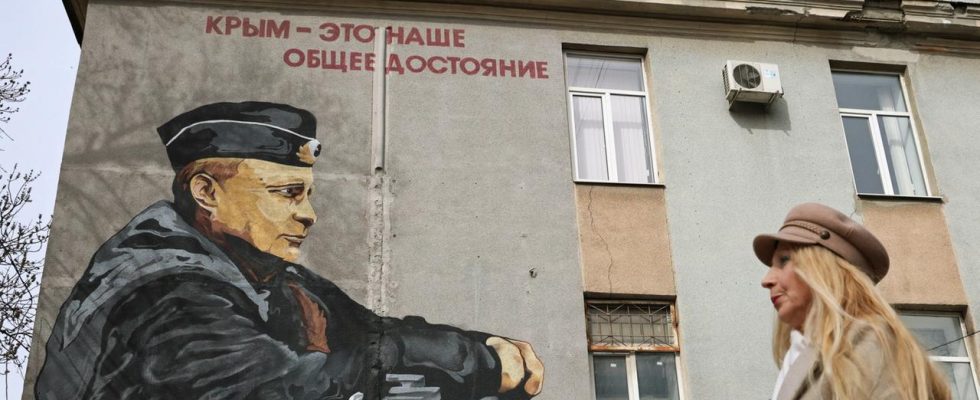It has been ten years since the annexation of Crimea – since then Russia has been arming the peninsula and is apparently abducting civilians from other occupied areas there. The whereabouts of the prisoners have long been unclear and the conditions in which they are held are appalling.
Faride Abdurachmanowa took extra time for the conversation. The 27-year-old gives her cell phone to her daughter and turns on a children’s series. Then she begins to talk about the day two years ago that would change her life forever. “They took my husband with them. There were seven of them, they came into the house, sent the children into my room. And then all I heard was screaming and beating. They tortured him very badly.”
At the beginning of the Russian war of aggression, the young family still lived in a small village in the south of Ukraine – just a few kilometers from the annexed Crimean peninsula, right by the sea. The Russian occupiers accused Abdurakhmanova’s husband of being a member of a Crimean Tatar battalion. The Muslim minority to which the family belongs is particularly in the focus of the Russian authorities.
“We didn’t have a chance to ask anything. The whole room was covered in blood,” she says. “They tied his hands with tape, put a bag over his head, tied everything up with tape and threw him in the car. After three or four days we got a call from the FSB that he was there.”
The trail is lost in Crimea
There – that means: in Simferopol, in the Crimea. Ten years ago, Russia annexed the Ukrainian peninsula. Today it is of extremely great symbolic, political and military importance. But not only that, explains Olha Skrypnyk from the human rights group Crimea: “What is important to mention – and a completely new situation for Crimea – is that Crimea has become a prison for people from the newly occupied Kherson and Zaporizhzhia regions . They are kidnapped and taken to Crimea. Previously, there was only the number one detention center in Simferopol, where, among other things, political prisoners were imprisoned.”
Abdurakhmanova’s husband is one of an estimated hundreds of Ukrainian civilians who were forcibly brought to Crimea from the south of the country. How many people in total have been abducted and imprisoned in the areas occupied since 2022 is difficult to determine, says Olha Skrypnyk.
People would disappear into the Russian prison system, cut off from the outside world: “When relatives, lawyers, the Red Cross or the Ukrainian authorities get involved, the Russian authorities do not confirm the detention of the person they are looking for. They don’t have a lawyer,” she says. “They were kidnapped in Kherson, Oleshky or Melitopol, but are not officially in Simferopol either. Formally they don’t even exist.”
Hatched: territories occupied by Russia
No regulation for civilians
In the first year of Russia’s war of aggression alone, two new prisons were registered in Simferopol in Crimea, says Skrypnyk. The AP news agency has researched that there will be at least 25 new prisons in the occupied territories of Ukraine within a few years. There is currently little hope of release for detained civilians, explains human rights activist Skrypnyk.
“The Geneva Convention says nothing about civilian prisoners. It was not assumed that a country would simply hold thousands and thousands of civilians during a war.”
There is an established procedure for prisoners of war; soldiers can return home through prisoner exchanges. “There is no such thing for civilians. We are now looking for a mechanism, at least some way, to bring these people home,” says Skrypnyk. But often it is too late: the captured and abducted people die as a result of torture, a lack of medical care or the terrible prison conditions – “and we don’t even know exactly where they are.”
Faride Abdurakhmanova’s husband has now been transferred to a prison in Russia. This much is known to the family. She says she tries to stay strong for the sake of the children and hopes every day that her husband will be released. Even if that would border on a miracle.
Rebecca Barth, ARD Kiev, tagesschau, March 18, 2024 11:23 a.m

